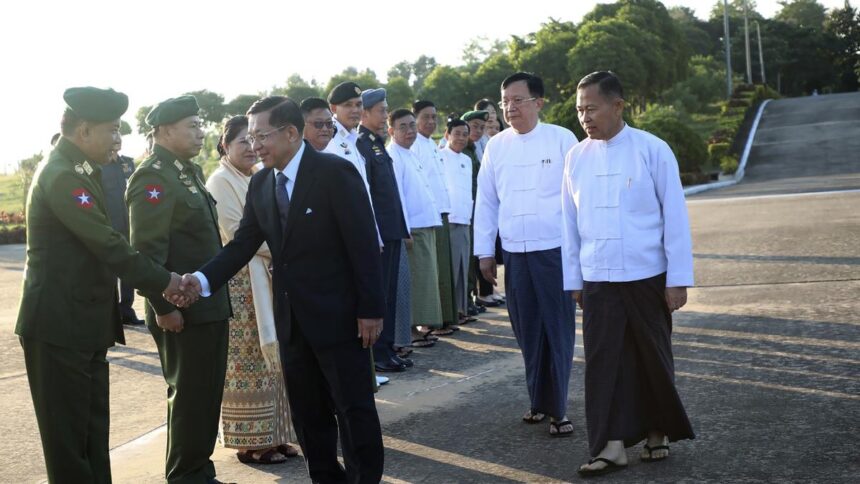
Myanmar military leader Senior General Min Aung Hlaing (front right) shakes hands with military officers as members of the State Administration Council including deputy leader Vice General Soe Win (far right) watch their departure to China at the airport in Naypyitaw, Myanmar, on November 5, 2024. | Photo Credit: AP
The head of Myanmar’s military government General Min Aung Hlaing started, Tuesday (November 5, 2024), on an official visit to China, the most important international ally in Southeast Asia, for several regional meetings.
It is the first time Senior General Min Aung Hlaing has traveled to the neighboring country since his Army seized power in February 2021 from the elected government of Aung San Suu Kyi.
Myanmar’s army has suffered unprecedented battlefield defeats in the past year, especially in areas near the Chinese border. Myanmar’s ruling generals and the Chinese government have expressed concern that pro-democracy guerrillas and armed ethnic minority groups, sometimes working together, have taken the initiative in the fight against military rule.

But Beijing is now concerned about the instability that threatens its strategic and business interests in Myanmar. The Chinese government has maintained a good working relationship with Myanmar’s ruling military, which is shunned and condemned by many Western countries for its Army takeover and human rights abuses.
State-run MRTV television said that Min Aung Hlaing left the capital, Naypyitaw, on Tuesday morning (November 5, 2024) to begin his visit.
He will visit the city of Kunming in China on Wednesday and Thursday (6 and 7 November 2024) to attend three summits: The Greater Mekong Subregion, Ayeyawady-Chao Phraya-Mekong Economic Cooperation Strategy and the Cambodia-Laos-Myanmar-Vietnam Cooperation. Kunming, the capital of China’s Yunnan province, is about 400 km (250 miles) from the border with Myanmar.
The report said he will also “meet with Chinese government officials to discuss ways to improve welfare, the economy and various sectors between the government and the people.”
Editor | Changing tides: On Myanmar’s democracy and civil war
China, along with Russia, is the main supplier of weapons to Myanmar’s military in its fight against resistance forces. Beijing is also Myanmar’s largest trading partner and has invested billions of dollars in mines, oil and gas pipelines, and other infrastructure.
Russia is the only other foreign destination known to Min Aung Hlaing since taking power, apart from attending the April 2021 summit of the Association of Southeast Asian Nations in the Indonesian capital, Jakarta. His government’s refusal to cooperate in efforts to resolve his country’s conflict peacefully has resulted in him and other Myanmar government officials being disinvited from ASEAN summits since then.
Myanmar’s pro-democracy opposition has expressed concern over China’s acceptance of Min Aung Hlaing’s visit.
Kyaw Zaw, a spokesman for the Opposition National Unity Government, said in a recorded video posted on Facebook before the official announcement of the trip that he was deeply concerned about China’s invitation to Min Aung Hlaing and asked the Chinese government to review his actions.
“The people of Myanmar want stability, peace and economic growth. It is Min Aung Hlaing and his group who are destroying these things,” Kyaw Zaw said. “I am worried that it will inadvertently lead to a misunderstanding of the Chinese government among the people of Myanmar.”
The shadow National Unity Government was established by elected members of parliament who are barred from taking their seats in 2021 and is linked to Suu Kyi’s former National League for Democracy party, which has friendly relations with Beijing. Although China is criticized by many for supporting the Army, the shadow government tries to avoid antagonizing Beijing too much, recognizing its influence in the region.
Myanmar’s army has been on the defensive since late last year when ethnic armed groups suffered major defeats in the country’s northeast.
The attack by the “Three Brotherhood Alliance,” consisting of the Myanmar National Democratic Alliance Army, the Arakan Army and the Ta’ang National Liberation Army, was able to quickly seize cities and seize military bases and command centers and strategic cities along the border China. in the northeastern part of the Shan State is widely seen at the time as having Beijing’s tacit support to stamp out rampant organized crime activities in the area controlled by ethnic Chinese.
Beijing helped broker a cease-fire in January, but it collapsed in June when ethnic rebel forces launched a new offensive. China is unhappy with the ongoing war, closing border crossings, cutting electricity to Myanmar’s cities and taking other measures to prevent the war.
Published – 05 November 2024 12:19 IST




